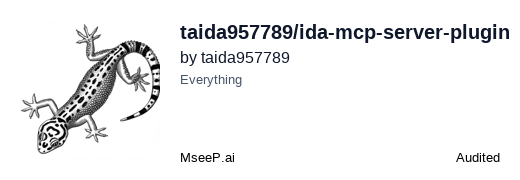- Explore MCP Servers
- ida-mcp-server-plugin
Ida Mcp Server Plugin
What is Ida Mcp Server Plugin
The ida-mcp-server-plugin is a plugin for IDA Pro that enables remote querying and control through the Model Context Protocol (MCP) interface, allowing AI assistants like Claude to interact with IDA Pro for binary analysis tasks.
Use cases
Use cases for the ida-mcp-server-plugin include automating binary analysis tasks with AI assistants, enhancing the efficiency of reverse engineering processes, and facilitating the extraction of detailed information from binary files for security research.
How to use
To use the ida-mcp-server-plugin, install the required Python dependencies, copy the plugin file to the IDA Pro plugins directory, configure your AI assistant to connect to the MCP server running locally on port 3000, and then open a binary file in IDA Pro to start using the analysis tools.
Key features
Key features of the ida-mcp-server-plugin include the ability to retrieve byte data, disassembly code, decompiled pseudocode, function names, segment information, cross-references, import/export tables, entry points, and various data types from binary files.
Where to use
The ida-mcp-server-plugin is primarily used in the field of binary analysis, particularly in reverse engineering, malware analysis, and software security assessments.
Clients Supporting MCP
The following are the main client software that supports the Model Context Protocol. Click the link to visit the official website for more information.
Overview
What is Ida Mcp Server Plugin
The ida-mcp-server-plugin is a plugin for IDA Pro that enables remote querying and control through the Model Context Protocol (MCP) interface, allowing AI assistants like Claude to interact with IDA Pro for binary analysis tasks.
Use cases
Use cases for the ida-mcp-server-plugin include automating binary analysis tasks with AI assistants, enhancing the efficiency of reverse engineering processes, and facilitating the extraction of detailed information from binary files for security research.
How to use
To use the ida-mcp-server-plugin, install the required Python dependencies, copy the plugin file to the IDA Pro plugins directory, configure your AI assistant to connect to the MCP server running locally on port 3000, and then open a binary file in IDA Pro to start using the analysis tools.
Key features
Key features of the ida-mcp-server-plugin include the ability to retrieve byte data, disassembly code, decompiled pseudocode, function names, segment information, cross-references, import/export tables, entry points, and various data types from binary files.
Where to use
The ida-mcp-server-plugin is primarily used in the field of binary analysis, particularly in reverse engineering, malware analysis, and software security assessments.
Clients Supporting MCP
The following are the main client software that supports the Model Context Protocol. Click the link to visit the official website for more information.
Content
IDA Pro MCP Server
IDA Pro MCP Server is a plugin that allows remote querying and control of IDA Pro through the Model Context Protocol (MCP) interface. This plugin enables AI assistants (such as Claude) to interact directly with IDA Pro for binary analysis tasks.
Overview
This server provides a series of tools that allow AI assistants to perform the following operations:
- Get byte data from specific addresses
- Get disassembly code
- Get decompiled pseudocode
- Query function names
- Get segment information
- List all functions
- Find cross-references
- Get import/export tables
- Get entry points
- Define/undefine functions
- Get various data types (dword, word, byte, qword, float, double, string)
- Get all strings in the binary file
- Get the length of the instruction at the specified address
Installation
Note: This plugin is designed for and tested with IDA Pro version 9.0+.
- Ensure Python and related dependencies are installed:
pip install -r requirements.txt
- Copy the
ida-mcp-server.pyfile to the IDA Pro plugins directory:- Windows:
%Programfiles%\IDA Pro 9.0\plugins\ - Linux:
~/.idapro/plugins/ - macOS:
~/Library/Application Support/IDA Pro/plugins/
- Windows:
Configure Claude / VSCode
Add the following configuration to the mcp.json file in Claude or VSCode:
{
"mcpServers": {
"IDAPro": {
"url": "http://127.0.0.1:3000/sse",
"type": "sse"
}
}
}Usage
- Open a binary file in IDA Pro
- The plugin will automatically load and start the MCP server locally (port 3000)
- Connect your AI assistant (e.g., Claude) to this server
- Use the AI assistant to perform binary analysis tasks
Available Analysis Tools
IDA Pro MCP Server provides the following tools:
get_bytes: Get bytes at a specified addressget_disasm: Get disassembly at a specified addressget_decompiled_func: Get pseudocode of the function containing the specified addressget_function_name: Get function name at a specified addressget_segments: Get all segment informationget_functions: Get all functions in the binaryget_xrefs_to: Get all cross-references to a specified addressget_imports: Get all imported functionsget_exports: Get all exported functionsget_entry_point: Get the entry point of the binarymake_function: Create a function at a specified addressundefine_function: Undefine a function at a specified addressget_dword_at: Get the dword at a specified addressget_word_at: Get the word at a specified addressget_byte_at: Get the byte at a specified addressget_qword_at: Get the qword at a specified addressget_float_at: Get the float at a specified addressget_double_at: Get the double at a specified addressget_string_at: Get the string at a specified addressget_string_list: Get all strings in the binaryget_strings: Get all strings in the binary (with addresses)
Best Practices
When analyzing binary files, it’s recommended to follow these steps:
- Examine the entry point
- Analyze the import table
- Review strings
- Track key API calls
- Identify main functional blocks
- Analyze control flow
- Identify malicious behaviors
- Analyze algorithms and encryption routines
- Document analysis results
- Use advanced techniques
License
MIT License
Copyright © 2023
Permission is hereby granted, free of charge, to any person obtaining a copy
of this software and associated documentation files (the “Software”), to deal
in the Software without restriction, including without limitation the rights
to use, copy, modify, merge, publish, distribute, sublicense, and/or sell
copies of the Software, and to permit persons to whom the Software is
furnished to do so, subject to the following conditions:
The above copyright notice and this permission notice shall be included in all
copies or substantial portions of the Software.
THE SOFTWARE IS PROVIDED “AS IS”, WITHOUT WARRANTY OF ANY KIND, EXPRESS OR
IMPLIED, INCLUDING BUT NOT LIMITED TO THE WARRANTIES OF MERCHANTABILITY,
FITNESS FOR A PARTICULAR PURPOSE AND NONINFRINGEMENT. IN NO EVENT SHALL THE
AUTHORS OR COPYRIGHT HOLDERS BE LIABLE FOR ANY CLAIM, DAMAGES OR OTHER
LIABILITY, WHETHER IN AN ACTION OF CONTRACT, TORT OR OTHERWISE, ARISING FROM,
OUT OF OR IN CONNECTION WITH THE SOFTWARE OR THE USE OR OTHER DEALINGS IN THE
SOFTWARE.
Dev Tools Supporting MCP
The following are the main code editors that support the Model Context Protocol. Click the link to visit the official website for more information.












